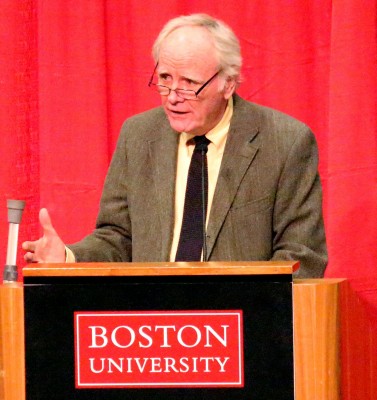
Award-winning author and Boston Globe columnist James Carroll spoke Tuesday about his career and faith as part of the Friends Speaker Series hosted by the Howard Gotlieb Archival Research Center.
The talk, held in the Metcalf Ballroom in the George Sherman Union, preceded the unveiling of a new exhibit featuring archives of his work. Around 150 BU students and Boston residents attended to hear Carroll speak.
As both a novelist and a columnist, Carroll said he realizes the two careers share a common idea.
“The skills of creating a narrative, a beginning, middle and an end, which is what fiction does, also applies to the world of journalism because every story has to have that shape, a beginning, a middle and an end,” he told The Daily Free Press before his speech. “Giving it that shape is a way of bringing meaning to an otherwise meaningless experience. It’s just a great privilege to be a writer.”
Before his journalistic success, Carroll was a Catholic chaplain at Boston University in the late 1960s to early 1970s. He accredits BU for making him the man he is today and providing him with important experiences in his career.
“One of the most important experiences I had here at BU, I want to begin by acknowledging it, was my initiation into the just-then-burgeoning post-Holocaust dialogue between Christians and Jews,” he said in his speech. “Eventually, the Catholic Church’s unfinished reconnecting with its historic failures in relation to the Jewish people, not just in the 20th century but just in two millennium, would occupy the center of my work as a writer. That preoccupation began here.”
In 1974, Carroll left BU and the priesthood and found himself outside of the church. A priest’s decision to leave the church, he said, is often looked down upon by the religious community. However, Carroll said he never completely left the church and his faith behind. Rather, it helped him restore his faith, he said.
“People sometimes refer to my having left the priesthood as my having left the church,” he said during the talk. “I did not leave the church. I remain a practicing Catholic … Oddly enough, my Catholic faith was reused by my decision to leave the priesthood.”
Carroll said once he left the priesthood, he finally found his true identity. He became a writer, dabbling in different genres of writing such as novels and memoirs until he eventually found his voice as a columnist for the Globe.
“My identity took shape around an activity, a simple activity, which was only getting to the table everyday, picking up a pen, settling down before a keyboard and setting out on the endless search for the right word,” he said. “I came to understand myself in terms of not any particular genre, but as a mere writer.”
Because of his transition from a chaplain to a writer, most of his writings center around matters of religion, politics and human frailty, Carroll said. Similarly, he compares the act of writing to faith.
“In the simple act of writing, the redemptive shape of narrative form, the unquenchable thirst for meaning which drives every writer, the contemplative habit of absorptiveness … these are the notes of the writing life, and they are the notes, as I discovered it, of a kind of faith,” he said in the talk. “God, as we say, the author of creation. Creation as the story God is telling, why we Christians call Jesus ‘the word.’”
Several student attendees said they are inspired by Carroll’s career and intrigued by the concepts of faith he presented.
Abigail Shannon, a sophomore in the College of Arts and Sciences, said Carroll provided a modern perspective on religion.
“He brought an interesting perspective to religion in terms of our generation,” she said. “Especially when a lot of people think about the Bible and traditional stuff when really that isn’t how religion needs to be interpreted. There’s a lot more to it than tradition.”
Chelsea Beytas, a senior in the Sargent College of Health and Rehabilitation Sciences, said Carroll introduced a unique outlook when it comes to faith.
“He mentioned how his connection with Christianity was stronger after leaving the priesthood,” she said. “I can see that maybe for the way he wanted to achieve Christianity, priesthood wasn’t the right route for him. That was interesting. [He] was in the position that should be the gold standard to achieving religious clarity and revelation. That wasn’t happening for him.”
Emmy Parks, a junior in CAS, said Carroll’s story encouraged her to continue motivating herself in her own academic and professional careers.
“It was a really reassuring talk because I am in the point of my academic career where I think I should be more accomplished,” she said. “It was really reassuming when he said he didn’t think he would be the person he is now a half-century ago. It was reassuring that he changed paths in his life.”















































































































